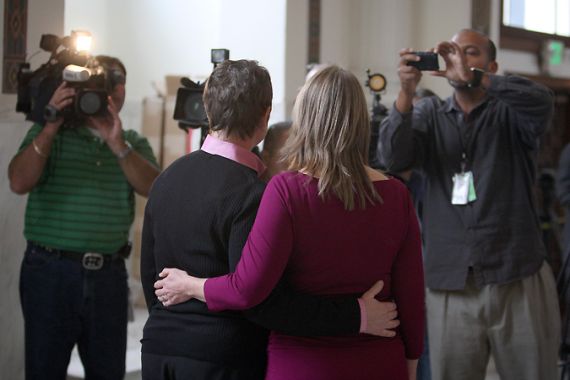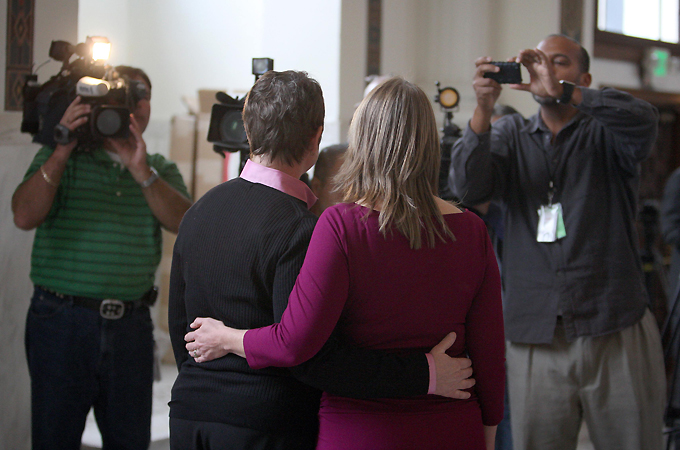US court reverses gay marriage ban
Federal appeals court rules California law violates constitution in latest round over same-sex marriage.

 |
| Decision does not give California’s same-sex couples the immediate right to marry as ban remains effective [REUTERS] |
A US federal appeals court has struck down a California law that strips gay couples of the right to marry in the latest round in America’s long-running battle over same-sex marriage.
The Ninth Circuit Court of Appeals on Tuesday upheld a lower court judge’s ruling that an amendment to the California state constitution banning same-sex marriage violated principles of due process and equal protection under the law.
The ruling was relatively narrow in scope and did not address whether same-sex partners have a broader constitutional right to marry.
The decision did not give gay couples the immediate right to wed as the ban remains effectively in force until the US Supreme Court rules on a likely final appeal.
Gay marriage was briefly authorised in California in 2008, but later banned by a referendum on what was known as Proposition 8, which rewrote the state’s constitution to restrict marriage to unions between a man and a woman.
The three-judge appeals panel in San Francisco ruled 2-1 that a lower court had properly declared the ban a violation of the American constitution.
The ban had violated equality laws “to target a minority group and withdraw a right that it possessed, without a legitimate reason for doing so,” Judge Stephen Reinhardt wrote in the majority opinion.
“Proposition 8 serves no purpose, and has no effect, other than to lessen the status and human dignity of gays and lesbians in California,” the opinion said. “The constitution simply does not allow for laws of this sort.”
In a dissenting opinion, Judge Randy Smith argued that the government could have a legitimate interest in preventing same-sex couples from marrying.
California’s Attorney General Kamala Harris applauded the decision, calling it “a victory for fairness, a victory for equality and a victory for justice”.
Rea Carey, executive director of the National Gay and Lesbian Task Force, welcomed the decision, saying same-sex couples should be “able to share in the celebration and responsibilities of marriage.”
“People from every background and every circumstance get this; they understand because being able to marry the one you love and care for your family are shared values that strike at the very core of who we are as a people,” Carey said.
“Denying loving couples and their families something so fundamental is to deny our common humanity.”
All three judges agreed that the federal judge who previously found the voter-approved ban unconstitutional had no obligation to disclose that he was in a long-term gay relationship or recuse himself from the case.
Gay marriage is legal in six states so far – Connecticut, Iowa, Massachusetts, New Hampshire, Vermont and New York as well as in the capital city Washington – and is a hot-button political issue nationally.
At the White House, a spokesperson for the president, Barack Obama, declined to comment on the specifics of the case, but noted that the president has “long opposed divisive and discriminatory efforts to deny … rights and benefits to same-sex couples”.
The Family Research Council, a group opposed to legal rights for same-sex couples, expressed disappointment.
Tony Perkins, the council’s president, said the decision was “not surprising, coming from the most liberal circuit court in the country”.
“We remain confident that in the end, the Supreme Court will reject the absurd argument that the authors of our constitution created or even implied a ‘right’ to homosexual ‘marriage,’ and will instead uphold the right of the people to govern themselves.”